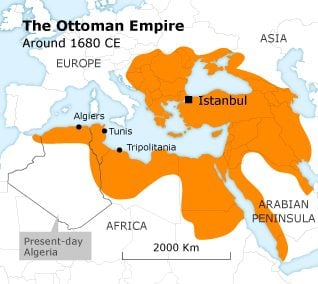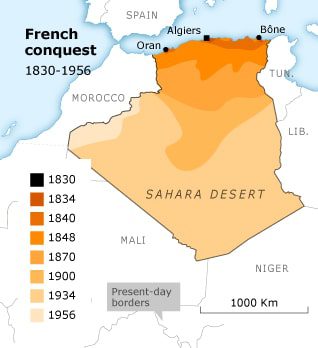
Introduction
The demise of the Almohads beginning in the 13th century was followed by a period of relative calm under the Zayyanids, a dynasty ruling western Algeria from their capital, Tlemcen. North Africa returned more or less to the political situation that had prevailed in Roman times, with three Berber empires ruling parts of present-day Algeria, Morocco, and Tunisia.
Without a strong Islamic empire to oppose them. However, the rising European powers sought to strengthen their influence in the Mediterranean. This coincided with a chaotic period of invasions of the Maghreb by Europeans and the rule of local leaders who made their living raiding ships on the Mediterranean trade routes.
Spain, in particular, sought to expand its rule in North Africa and became involved in a power struggle with the emerging Ottoman Empire. Originating in Turkey, the Ottomans gradually came to control large parts of the Arab world (Morocco being a major exception) and the Mediterranean region.
Algiers called on the Ottoman sultan to maintain order, and Algeria thus became part of the Ottoman Empire in the 16th century. In practice, this meant that local representatives of the empire based in Algiers had considerable autonomy.
These Turkish rulers dominated mainly the coastal cities and were far less effective in the interior, which was the local uprising scene by tribal groups. Regional divisions thus remained in place, there being, at the time, no widespread Algerian identity.
French Colonial Era

In 1830 a French expeditionary force invaded Algiers on the pretext of an insult to the local Ottoman ruler’s French ambassador (dey). As a matter of fact, however, the military gamble was designed to cover up domestic economic mismanagement by the government in Paris by stirring nationalist feelings.
In line with the imperialist mood in Europe, the French held on to the territory when they saw some important economic and political opportunities arising from Algeria’s colonization.
The coastal plains were not only fertile and thus economically attractive but also proved to be a useful political ‘safety valve’ by providing land on which poor peasants from the French mainland could settle.
In general, however, the Algerian territory came to be dominated by large-scale agricultural enterprises, particularly the wine industry.
From the beginning, the continuing colonization led to fierce resistance by local rulers and the population. The most important resistance leader was emir (commander) Abdelkader (Abd al-Qadir al-Jazairi), who managed to maintain control over much of Algeria. Abdelkader’s forces were, however, defeated by overwhelming French military forces.
After 1962, the emir acquired an important place in the official history of the independent state, as he was considered the founder of the first Algerian state and thus the precursor of the National Liberation Front (Front de Libération Nationale, FLN).) Rebellions occurred regularly in Kabylia, including the uprising led by sheikh Mokrani in 1871. In the southern Sahara, Tuareg forces, too, resisted the French army, unable to control the desert regions until the Tuareg were defeated in 1902.
The colonial territories became home to hundreds of thousands of settlers from France and other southern European countries. In 1848 Algeria was annexed to France and divided into three departments. European colonists and their descendants automatically became French citizens. The same was true for the Jewish community, which had been part of Algeria for two thousand years. As stipulated in the Decret Crémieux in 1870, all Algerian Jews automatically became French citizens.
Most colons, also called pieds noirs (lit., black feet), started agricultural enterprises to produce wine grapes, oranges, or grain. The main cities grew to resemble French provincial towns – which they were, in the mind of the colonial population and Paris’s political leadership.
Algeria was regarded not as a colony but as part of France itself. French domination meant that the Algerians themselves became second-class citizens in their own country. Only in 1958, after the outbreak of the war of independence, did they gain the right to French citizenship. Their status as ‘Muslims within France’ brought them far fewer rights than were attained by Europeans who had only recently arrived. If they were integrated into the economic system at all, they served as laborers on the colonial estates. Education opportunities were limited to a tiny minority of the original population.

